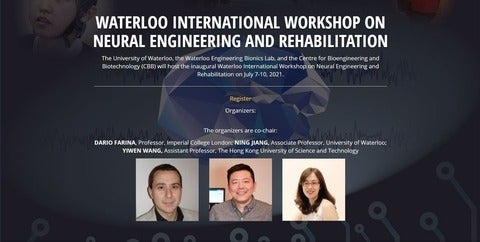



Welcome!
 What
do
we
do?
What
do
we
do?

The Waterloo Engineering Bionics lab develops technologies that will shape the future of the interaction of human and artificial systems. We conduct inter-disciplinary research across neuro-engineering, artificial intelligence, robotics, neuroscience, and medicine. We study mainly on physiological signals, such as electromyogram (EMG), electroencephalogram (EEG) and electrocardiogram (ECG), extracting useful information such as motion intentions, sensory processing, emotional states and cognitive processing. With these information, we develop systems that would allow synergistic interaction between human and artificial systems, computers, robotics, mobile devices, virtual reality etc. Our lab collaborates with hospitals, industry partners, and other research labs from all over the world to create novel ideas that are accessible to everyone.
Specifically, we are working on non-invasive brain-computer interfaces, affordable intelligent thought-controlled prosthetics and mobile ECG solutions.
News
Paper accepted in IEEE Transactions in Neural Systems and Rehabilitation Engineering
Paper titled "Enhanced System Robustness of Asynchronous BCI in Augmented Reality using Steady-state Motion Visual Evoked Potential" has been accepted in the Journal of IEEE Transactions in Neural Systems and Rehabilitation Engineering .
Authors:
Aravind Ravi, Jing Lu, Sarah Pearce, and Ning Jiang
Congratulations!
Waterloo International Workshop on Neural Engineering and Rehabilitation
Waterloo International Workshop on Neural Engineering and Rehabilitation invites world-leading experts as well as their Canadian colleagues to exchange the latest development of their research in neural interfacing hardware, neural signal processing, and algorithm research, and also topics in translational research topics in applying neural technologies in the clinical population.
Ning's interview with CBC on "Ethical questions around neural implant technology"
We are excited to listen to Dr. Jiang's and Dr. Jennifer Boger's interview with Matt Galloway on this episode of The Current!
Here is an introduction on the CBCListen:
